Representation - Being seen, being heard and making future focussed decisions.
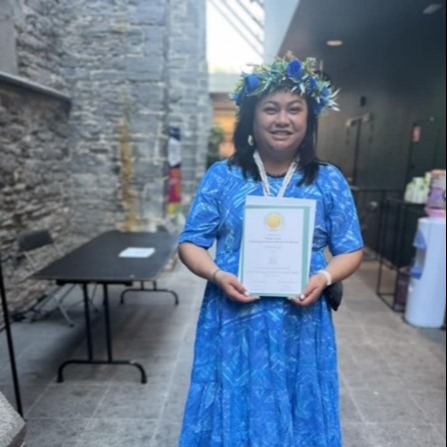
Taputu holding finalist certificate at the Digital Preservation Coalition awards in Ghent, Belgium
The Digital Pasifik project was recently honoured as a finalist in the Digital Preservation Awards, held during the iPres 2024 conference in Ghent, Belgium. The specific award was the National Archives (UK) Award for Safeguarding the Digital Legacy. This was the first time a Pacific project was recognised in these prestigious awards. Although Digital Pasifik did not win, being acknowledged alongside exceptional global projects was an accomplishment in itself.
With support from the Digital Preservation Coalition, I attended the awards in person. My partner and I were likely the only Pacific Islanders ever to attend these awards, which have only been held in Europe, far far away from the Pacific. To honour and represent our roots, I wore a bright blue TAV dress and an ei katu (flower garland) to proudly stand out. This choice was a tribute to our supporters back in New Zealand and across the Pacific who were watching online, sending a clear message: we are here, and we are proud. Even as a lone islander in these spaces, I knew I had the support of the Pacific with me.
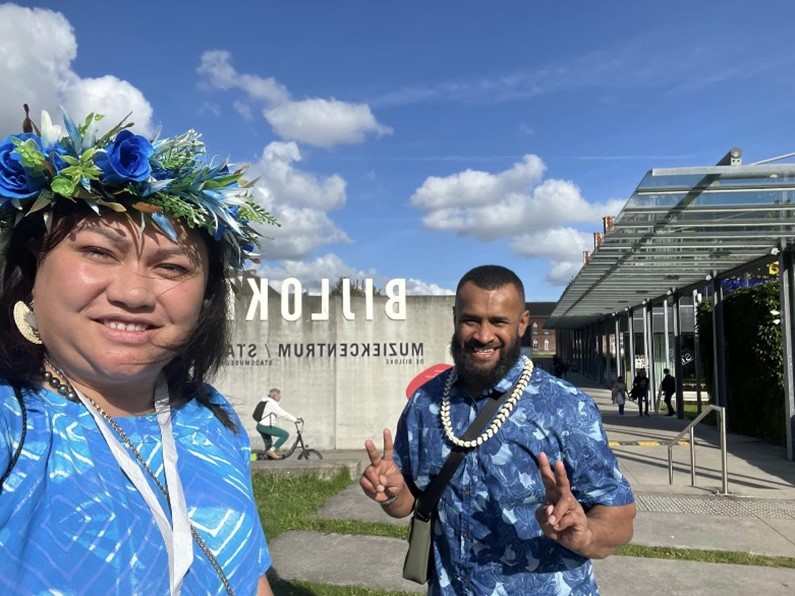
Taputu and her partner Watisoni Rokowaitui before the Digital Preservation awards ceremony.
I believe it is important for Pacific people to be represented in these spaces. Historically, past winners of these awards were Europeanbased projects and organisations, but this year Australasia had a big presence with PARADISEC one of our content partners winning The Digital Repository of Ireland Award for Research and Innovation and Bula’bula Arts Aboriginal Corporation took out The International Council on Archive Award for Collaboration and Cooperation.
The Pacific does outstanding work, but we often don’t place ourselves on the global stage. It’s essential for us to be present, not just at events but also on decision-making boards and councils, to ensure our perspectives are included. If we don’t step forward, we risk being overlooked, left behind by un-reachable standards that aren’t accessible or relevant for our communities.
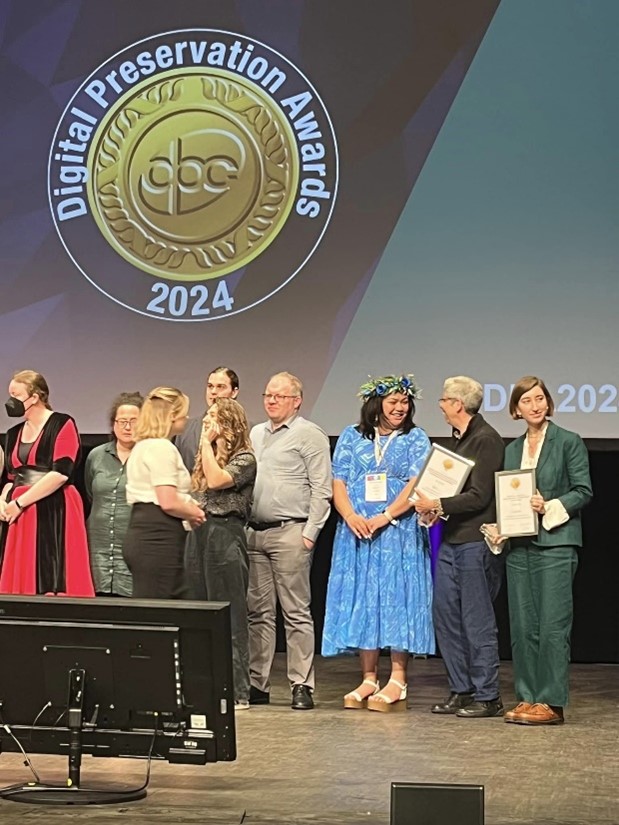
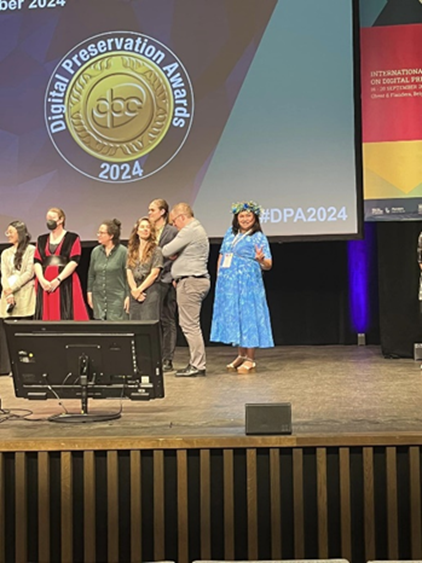
Taputu with Digital Pasifiks finalist certificate and on stage with other finalists from the digital preservation awards
I also attended the iPres 2024 conference, an international gathering focused on digital preservation. At iPres, I learned about emerging technologies, digitisation programs, and the cost of these complex systems. As I attended these workshops, I reflected that many of these tools and systems remain out of reach for the Pacific currently. Our institutions lack the budget and resources to implement them as they were being presented.
Yet, listening to these discussions, I realise that the Pacific has something powerful to teach the world about community engagement. In the Pacific, our approach to engagement is rooted in compassion, cultural awareness, and hospitality and much more. It’s something I am incredibly proud of when visiting Pacific based institutions and seeing them do this with ease. This perspective is something that we can offer to these global conversations about the process and practices of digital preservation.
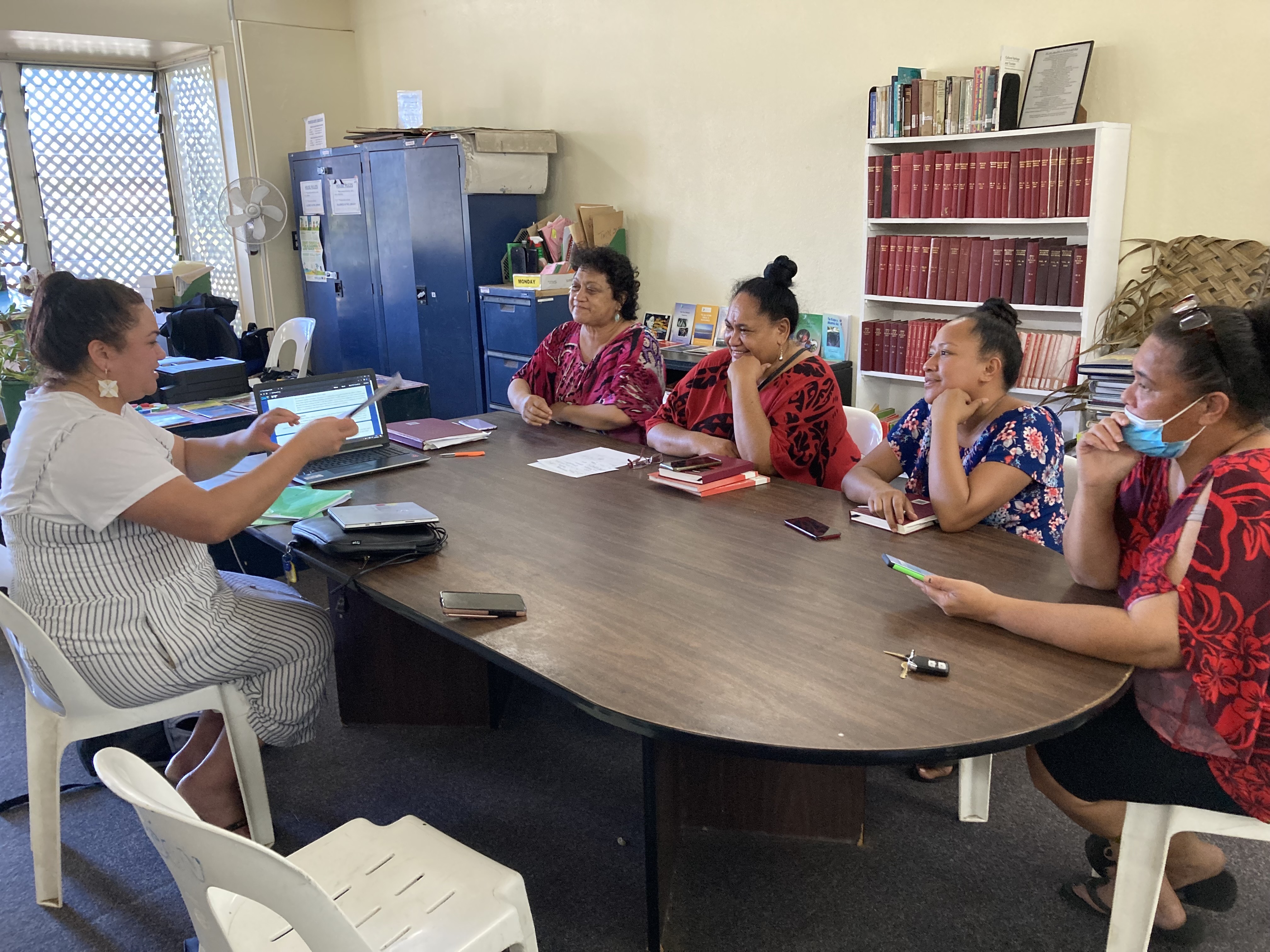
Taputu sharing the digitalpasifik.org platform with staff from TAURANGA VĀNANGA - Ministry of Cultural Development Cook Islands.
For Pacific communities digital preservation of our cultural and documentary heritage is crucial now. We have the opportunity to capture authentic stories of our people. While we excel at gathering the stories, or sharing them in person, we often lack clear steps for safeguarding them long term, so that they are accessible into the future. We often focus on creating physical exhibitions. But whilst these are meaningful, these are often at a certain place and for a limited time. Exhibitions are a collection of curated stories, objects and records.
As we consider digitisation and the eco-system that supports a digitally informed Pacific cultural heritage strategy. I would ask these questions:
How do we ensure these are accessible and available to Pacific communities and diaspora who cannot visit in person?
how do we sustainably design and build our digitisation strategies and systems?
how do we centre Pacific concepts and values into these systems and tools? If we are implementing digital strategies informed with the defaults of the West?
and how do we as Pacific leaders ensure we don’t implement the same liabilities and biases of the West?
Representation matters at every level. The Digital Pasifik website empowers families and individuals to connect with family records and share their stories through the user contribution feature. Without such representation, Pacific names and connections risk lost in an ocean of metadata, written without us, and still “about us”. Metadata that may not serve us in positive ways or indeed may further harm and exclude Pacific heritage. As Pacific leaders we need to be helping to define how we want to be known and how our stories should be told. In physical exhibitions, in digital formats and in the metadata that enables both of these. For now, and into the future. Those who record history define the narrative for the future, and so as this user contribution example below shows, the nuanced, relationship centred details of lived experience are often missed by our metadata-based systems.
The Digital Pasifik project shows that it is possible to hold multiple versions of our stories – and to enrich our shared knowledge.

Image of Ah Foo, also known as Ah Taripo, 1909, Te Papa Tongarewa Ah Foo | Collections Online - Museum of New Zealand Te Papa Tongarewa
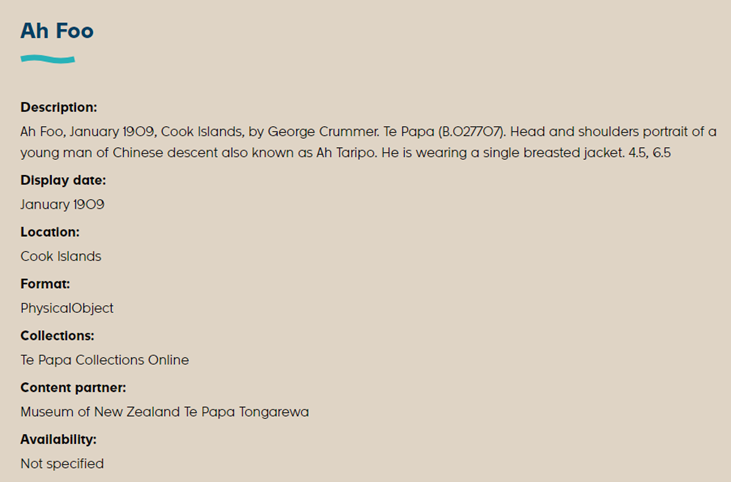
Meta-data of record from Te Papa Tongarewa
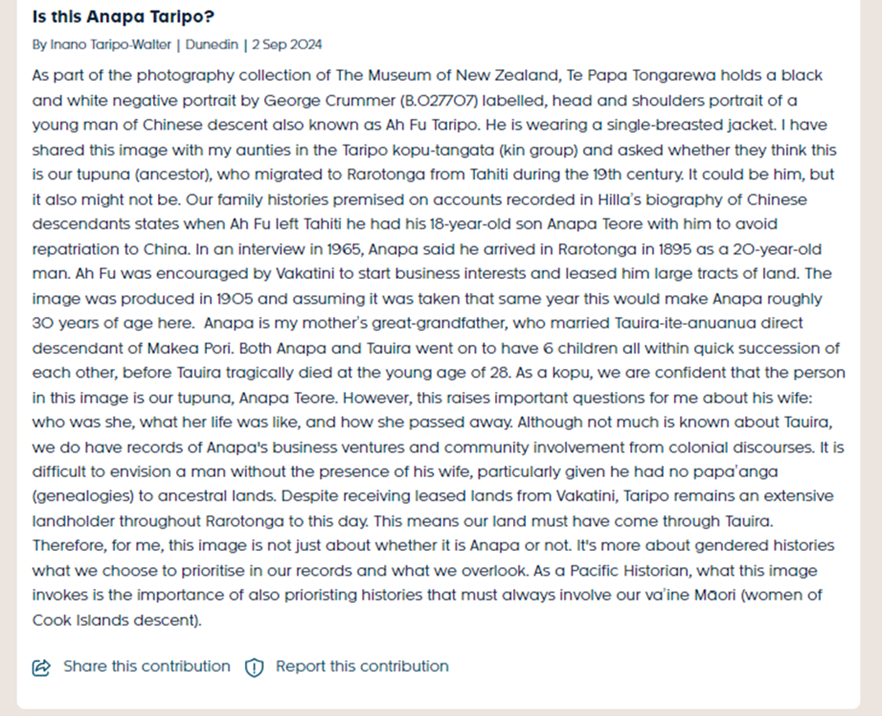
User contribution on digitalpasifik.org from Inano Taripo-Walter, sharing her relationship to Anapa Taripo https://digitalpasifik.org/items/179499?user_contribution_id=294
I’ve observed that Pacific GLAM sector are naturally gifted and masters at enabling their communities. We don’t need written policies or extensive research to do this work because we are the community. This understanding is a strength we can use to our advantage in digital preservation, making sure our narratives are not only preserved but shared in ways that truly resonate with our people and our future.
Tokelauan proverb - “Totō hau tōkiga nei, aua na tupulaga e fāi mai”
"Plant a seed today for the future generations"
The information on this site has been gathered from our content partners.
The names, terms, and labels that we present on the site may contain images or voices of deceased persons and may also reflect the bias, norms, and perspective of the period of time in which they were created. We accept that these may not be appropriate today.
If you have any concerns or questions about an item, please contact us.